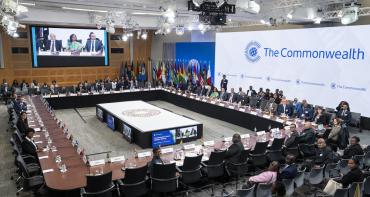The role of the Commonwealth is a positive influence for strengthening trade links across boundaries and building prosperity in which all can share, said Secretary-General Patricia Scotland.

The role of the Commonwealth is a positive influence for strengthening trade links across boundaries and building prosperity in which all can share, said Secretary-General Patricia Scotland. With rising protectionist sentiments and talk of trade wars, the Commonwealth becomes increasingly important as a positive influence, she said.
The Secretary-General was speaking at the Commonwealth Trade and Investment Forum on Australia’s Gold Coast, on the theme of ‘The Commonwealth - Business Advantages and Opportunities’.
“Our trade research finds that Commonwealth countries, overall, are less protectionist and tend to apply fewer harmful measures against fellow Commonwealth members. This means trade costs are lower,” said Secretary-General Scotland. “The prospects for greater investment are also promising. In 2017, cumulative intra-Commonwealth productive investment, that is, job-creating investments such as the construction of factories or processing plants, was around US$700 billion, creating 1.4 million jobs through 10,000 projects.
“At this rate, we project intra-Commonwealth productive investment could reach almost US$1 trillion by 2020. It is even more remarkable that in this category of foreign direct investment, we find that Commonwealth countries invest almost three times more in each other than in other countries. This is a clear example of Commonwealth Advantage in action.”
New research by the Commonwealth Secretariat also found that on average, Commonwealth countries enforce commercial contracts far more swiftly, taking 20 per cent less time compared to the world average.
The Secretary-General said, “For business people such as you, for whom certainty is so important when planning and making investment decisions, this finding is a major consideration. It will, I am sure, boost investor confidence in the Commonwealth.
“Other trade and investment gains come from our more effective and efficient governance frameworks, which is why we have established the Commonwealth Office of Civil and Criminal Justice Reform. Part of the work of the Office is to create and share best practice frameworks and implementation toolkits. We have also established a Commonwealth Innovation Hub, which also will boost trade by sharing best practice and lessons learned among our 53-member countries.”
Overall, said Secretary-General Scotland, Commonwealth members could take further steps to grow trade and investment. These included:
- improving trade logistics and trade facilitation
- tackling non-tariff barriers
- harnessing digital technologies for e-commerce and fintech, in which some of members, including Australia, are already pioneering world leaders
- identifying business opportunities from the emerging green and blue economies
- empowering women and young people as entrepreneurs and traders
And she had this message for Commonwealth member states in the Pacific.
“Here in the Pacific region, we cannot but be aware of the immense potential and opportunity offered through sustainable use of the ocean and marine resources. At the 2017 Ocean Conference the Commonwealth Blue Charter was launched, and it is currently being developed. It applies the principles and values of our Commonwealth Charter to ocean governance and development, and it will be considered by our Heads of Government when they meet later this month.”
Earlier, the Secretary-General presented the Queensland Premier Annastacia Palaszczuk with a special Commonwealth Games edition of the ‘2018 Commonwealth Trade Review’. This is a major report on trade and investment trends as well as promising prospects for business in the Commonwealth. The full version of the Review will be launched in London later this month at the Commonwealth Heads of Government Meeting (CHOGM).



